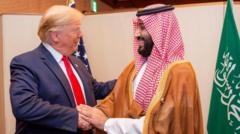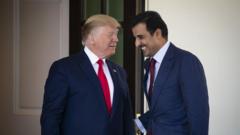As Trump approaches a pivotal Middle Eastern trip, a noticeable rift with Netanyahu over pressing security issues has emerged, signaling potential shifts in regional alliances.**
Strains in Leadership: Trump and Netanyahu's Diverging Paths**

Strains in Leadership: Trump and Netanyahu's Diverging Paths**
The evolving dynamics between Trump and Netanyahu could reshape the Middle East landscape.**
In a charged political climate, the relationship between Israeli Prime Minister Benjamin Netanyahu and former President Donald Trump has reached a critical juncture. Once characterized by mutual agreement, their alliance now appears to be straining as pressing issues around Middle Eastern security emerge.
Their last meeting in February at the White House displayed a harmonious alignment as both leaders shared their disdain for Iranian ambitions and declared the Houthi militants as a terrorist entity, showcasing a united front against perceived threats. “You say things others refuse to say,” Netanyahu praised Trump, signaling his approval of the unconventional rhetoric that often defined the president’s style.
However, this unity has not persisted. A recent encounter in April showcased a significant shift, with Netanyahu seemingly sidelined while Trump drifted into topics unrelated to Israel, underscoring their growing disconnect. As Trump prepares to embark on his first significant foreign visit this week to the Middle East, he now seems less inclined to endorse Netanyahu’s calls for immediate military actions against Tehran and has instead entered the realms of negotiation with Iran.
The Israeli leader has been vocal, cautioning that “a bad deal is worse than no deal,” signaling his apprehension over potential outcomes that could compromise Israel's security interests. This evolving dynamic could not only alter their bilateral relationship but also significantly impact geopolitical landscapes in the region, as both leaders stand at a crossroads with critical decisions ahead.





















